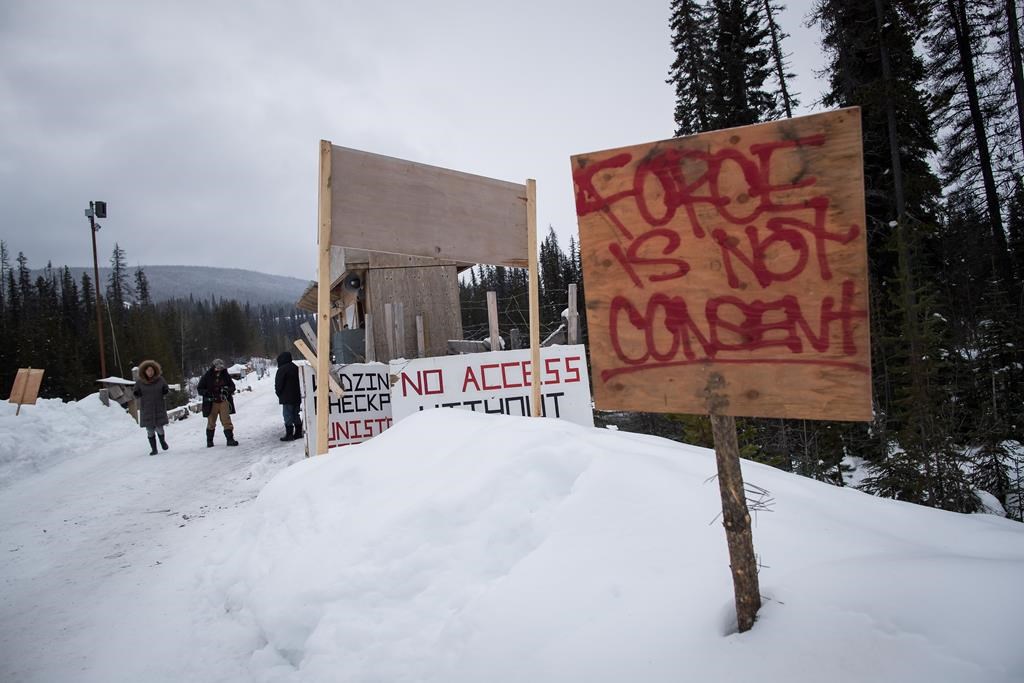The mounting tensions over the construction of a natural gas pipeline in the northwest part of the province present a unique challenge for the B.C. NDP government.

That is because the NDP finds itself at cross purposes over the issue, as it wants the pipeline built while at the same time insisting it will do all it can to accommodate First Nations’ interests.
While the pipeline has a lot of support from First Nations in the region, it has also met fierce opposition from one group of Indigenous leaders.
The pipeline is the $6.6 billion, 670_kilometre Coastal GasLink line that will eventually connect to the LNG Canada terminal in Kitimat.
The company building it says it has signed benefits agreements with all 20 elected First Nations councils along the line’s route.
However, more than a half dozen unelected hereditary chiefs of the Wet’suwet’en First Nations oppose the project and are doing everything they can to block or disrupt its construction.
The latest move by the hereditary chiefs (and a handful of activist supporters) was to issue this past weekend a so-called “eviction notice” to Coastal GasLink workers at a work site near the northwest community of Houston.
- Harper and Chretien talk Alberta separatism, Canadian sovereignty in Ottawa
- Danielle Smith says Alberta will withhold funding for judges without more input on selection
- MP Nate Erskine-Smith ‘exploring’ Ontario Liberal leadership, seeks seat
- Canada expects U.S. to stay out of domestic affairs: national security official
That notice came after a B.C. Supreme Court justice extended an injunction against the pipeline protesters, barring them from blocking company workers from accessing the site.
This dispute has all the markings of a confrontation that could get out of hand very easily, and one that will put the NDP government on the spot.

Get breaking National news
It is yet another issue that will remind the NDP that positions it took in opposition are not supportable or doable once it forms government.
Just weeks after patting themselves on the back for passing legislation that embraces the United Nations Declaration of the Rights of Indigenous Peoples (UNDRIP), the NDP government now finds itself being accused of trampling on the rights of Indigenous people.
The Union of B.C. Indian Chiefs has said the Wet’suwet’en has jurisdiction in the matter and has demanded both the B.C. and federal governments to accept that as fact.

But it is not as if the NDP government can walk away from the pipeline. It needs it built.
The LNG Canada project is a centerpiece of its long-term economic strategy and a cornerstone of its climate action plan. There are already signs the project has lit a fire under the local economy of the province’s northwest communities, something badly needed as the forest industry continues to go into a tailspin.
The government will inevitably have to align itself with the court’s position, and thus will likely find itself in a very dramatic showdown with the five hereditary chiefs and their supporters.
The RCMP will eventually enforce the extended court injunction against any blockade, and things could get ugly.
The tensions have also split the Wet’suwet’en community, although most reports seem to indicate the protesters have the support of just a minority of the members of the 12 hereditary house groups (which in turn fall under five clans).
In fact, the elected band councils of five First Nations that belong in the Wet’suwet’en First Nation support the pipeline and have signed economic benefits agreements.
This ongoing, unresolved dispute has magnified some key questions that can arise when trying to secure First Nations’ support for energy projects.

For example, are elected band councils the proper bodies to negotiate with, or are hereditary chiefs the ones to deal with?
In addition, can one single First Nations trump the deals other First Nations make to secure economic benefits?
All tough questions and ones the NDP government will have to answer as it begins adhering to UNDRIP and the ramifications that flow from it.
In this particular case, however, the NDP will have to follow the rule of law as defined by the courts. And doing that is going to be one heck of a political mess to get through.








Comments